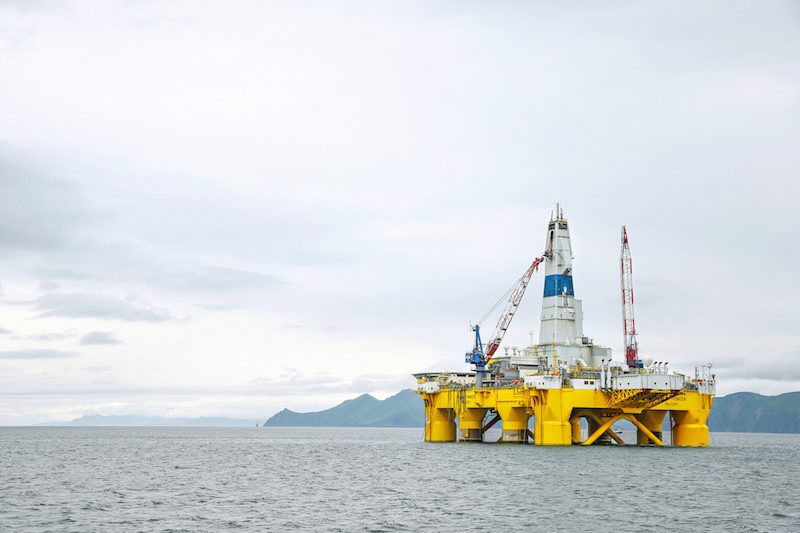Iranian Ship Linked to Houthi Attacks Heads Home Amid Tensions
(Bloomberg) — An Iranian ship that’s been linked to Houthi attacks in the Red Sea is returning home, removing a prominent asset in the area as the Islamic Republic braces...


Shell’s previously-contracted Polar Pioneer drilling rig that it used to drill exploratory well in the Chukchi Sea. Photo: Shell Alaska
![]()
![]()
WASHINGTON, Dec 20 (Reuters) – U.S. President Barack Obama on Tuesday permanently banned new oil and gas drilling in federal waters in the Atlantic and Arctic Oceans, in one of his last environmental pushes before he leaves office next month.
In protecting the waters, Obama used a 1950s-era law called the Outer Continental Shelf Act that allows presidents to limit areas from mineral leasing and drilling. Environmental groups said Obama’s use of the law meant the incoming administration of Republican President-elect Donald Trump could not simply reverse the action but would have to fight it in the courts.
The ban affects federal waters off Alaska in the Chukchi Sea and most of the Beaufort Sea and in the Atlantic from New England to Chesapeake Bay.
The move came in a joint announcement by Obama and Canadian Prime Minister Justin Trudeau to launch “actions ensuring a strong, sustainable and viable Arctic economy and ecosystem.”
Obama said in a statement on Tuesday that the joint actions “reflect the scientific assessment that, even with the high safety standards that both our countries have put in place, the risks of an oil spill in this region are significant and our ability to clean up from a spill in the region’s harsh conditions is limited.”
Canada will designate all Arctic Canadian waters as indefinitely off limits to future offshore Arctic oil and gas licensing, to be reviewed every five years through a climate and marine science-based life-cycle assessment.
The law under which Obama is acting enables a president to withdraw certain areas from leasing or drilling “for any public purpose,” such as to limit the impacts of climate change, according to a legal briefing by the Natural Resources Defense Council and Earth Justice.
Under that law, a president is not authorized to “undo” a previous withdrawal, making it more difficult for Trump to target without a lawsuit.
“No president has ever tried to undo a permanent withdrawal of an ocean area from leasing eligibility,” said Niel Lawrence, Alaska director and attorney at the Natural Resources Defense Council.
The provision has been used by six presidents from both parties over the past 65 years, including to withdraw as much as several hundred million acres at a time, he said.
The American Petroleum Institute oil industry group disagreed about the permanence of the ban and said Trump could likely use a presidential memorandum to lift the ban.
“We are hopeful the incoming administration will reverse this decision as the nation continues to need a robust strategy for developing offshore and onshore energy,” said Erik Milito, API’s upstream director.
Even if Trump attempts to battle the move, few energy companies have expressed a desire to drill anytime soon off the coasts thanks to abundant cheap shale oil in North Dakota and Texas.
Exploratory drilling in the Arctic is expensive and risky. Shell Oil ended its quest to explore in harsh Arctic waters in 2015, after a vessel it was using suffered a gash and environmentalists had uncovered a law that limited its drilling.
In 2015, just 0.1 percent of U.S. federal offshore crude production came from the Arctic. At current oil prices, significant production in the Arctic will not occur, according to a Department of Interior analysis.
On the Atlantic coast, local groups have opposed offshore drilling and would fight the Trump administration’s attempts to open it up.
“The people of the Atlantic coast have refused to allow their way of life to be compromised,” said Jacqueline Savitz, senior vice president of Florida-based ocean conservancy group Oceana.
She said the Obama administration move to protect the Atlantic coast was a “smart business decision” since it would protect the lucrative tourism and fishing industries of East Coast communities. (Reporting by Timothy Gardner and Valerie Volcovici; Editing by Peter Cooney)
(c) Copyright Thomson Reuters 2016.
Join the gCaptain Club for curated content, insider opinions, and vibrant community discussions.


Join the 105,983 members that receive our newsletter.
Have a news tip? Let us know.
Access exclusive insights, engage in vibrant discussions, and gain perspectives from our CEO.
Sign Up




Maritime and offshore news trusted by our 105,983 members delivered daily straight to your inbox.



Essential news coupled with the finest maritime content sourced from across the globe.
Sign Up